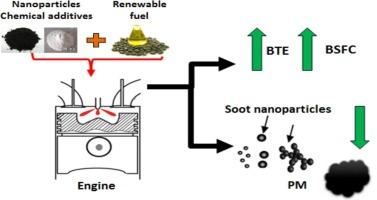Impact of adding nanoparticles into the oxygenated fuel blends on engine performance and emissions characteristics of NOX and PM in diesel engines: A comprehensive review
IF 4.2
Q2 CHEMISTRY, MULTIDISCIPLINARY
引用次数: 0
Abstract
Recently, the smaller sizes of nanoparticles (1–100 nm) were used in several applications such as biotechnology, engineering, internal combustion engines and medical sciences. Furthermore, the researchers inside scientific community highlighted on using nano additives into the diesel fuel, neat biodiesel or and biodiesel blends to enhance the thermophysical properties of nanofluid, stability aspects, emission characteristics, and combustion behaviour of diesel engine. This article provides overview of the contribution several of nanoparticles in reduce engine emissions and improve the process of combustion when they adding to the oxygenated fuel blends. Different types and concentrations of nanoparticles can be adding to the fuels to improve the fuel properties by enhancing the stability and physical properties of fuel to help the transport sector in meet stringent emission regulations. The impact of nanoparticles addition to the fuels on emissions of nitrogen oxide (NOX) and characteristics of particulate matter (PM) will be focused through collected data from the literatures that have been done along the earlier years. It is obtained that the results from adding nanoparticles to the oxygenated fuels are very encouraging because of multi-improvement in chemical and physical properties of nanofluid such as medium of high reactive for combustion, high surface to volume ratio, heat and mass transport properties. According to the several publications, it is found that the addition of nanoparticles to the renewable fuel blends reduced the emissions of NOX and PM (concentrations and number) than to the absence nano additives into the oxygenated fuels. In contrast, large size of PM produced as proved in several publications with adding nano additives to the oxygenated fuels in comparison with neat fuel blends.

在含氧燃料混合物中加入纳米颗粒对发动机性能和柴油发动机NOX和PM排放特性的影响:综合综述
最近,较小尺寸的纳米颗粒(1-100纳米)被用于生物技术、工程、内燃机和医学等领域。此外,科学界的研究人员强调,在柴油燃料、纯生物柴油或生物柴油混合物中使用纳米添加剂,可以提高纳米流体的热物理特性、稳定性、排放特性和柴油发动机的燃烧行为。本文概述了纳米颗粒在减少发动机排放和改善燃烧过程中的贡献,当它们添加到含氧燃料混合物中。可以向燃料中添加不同类型和浓度的纳米颗粒,通过增强燃料的稳定性和物理特性来改善燃料性能,从而帮助运输部门满足严格的排放法规。在燃料中添加纳米颗粒对氮氧化物(NOX)排放和颗粒物(PM)特性的影响将通过从早期文献中收集的数据进行重点研究。结果表明,在含氧燃料中加入纳米颗粒可使纳米流体的化学性质和物理性质得到多方面的改善,如高反应性燃烧介质、高表面体积比、传热和传质性质等。根据一些出版物,发现在可再生燃料混合物中添加纳米颗粒比在含氧燃料中不添加纳米添加剂减少了NOX和PM的排放(浓度和数量)。相比之下,在一些出版物中证明,与纯燃料混合物相比,在含氧燃料中添加纳米添加剂可以产生大尺寸的PM。
本文章由计算机程序翻译,如有差异,请以英文原文为准。
求助全文
约1分钟内获得全文
求助全文

 求助内容:
求助内容: 应助结果提醒方式:
应助结果提醒方式:


